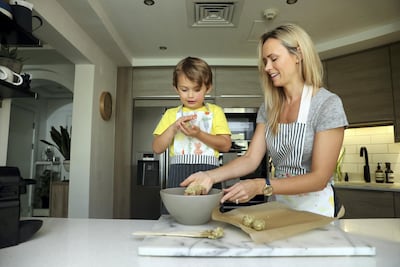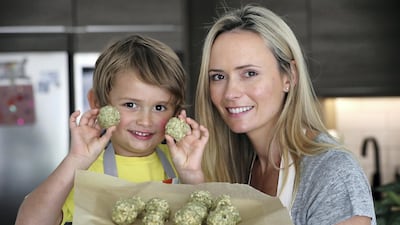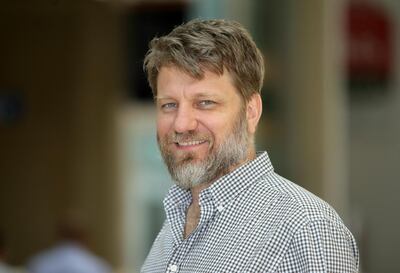Pictures of the oceans swathed in plastic have dominated headlines over the past year and now the United Nations is warning that we have just 12 years to limit a climate change catastrophe.
But what does that really mean for us on a day-to-day basis and how much will it cost us to go green?
Gemma McQueen, 35, a British office manager and executive assistant, is co-author of the book Real Food By Two Moms, a collection of healthy recipes for children, and says she would love to buy 100 per cent organic food.
But while organic food - free from artificial pesticides and fertilisers - is now readily available in the UAE, she says it is “just not affordable” for her to shop completely organic, with the rising cost of groceries.
Ms McQueen, who has lived in Dubai for 13 years, says organic food can cost almost three times as much as non-organic. A list of 19 standard organic items including fruit, vegetables, chicken, milk and eggs costs Dh385 from an online grocer versus Dh137 for non-organic - and her weekly food shop has increased from Dh800 to Dh1,200, for the same items, since the beginning of the year.
Each year the Environmental Working Group in the US releases a list of the ‘dirty dozen’: the fruit and vegetables most contaminated by pesticides. Strawberries (a third of which contain 10 or more pesticides, according to the group) top the list, followed by spinach, nectarines, apples, grapes, peaches, cherries, pears, tomatoes, celery, potatoes and peppers.
_________
Read more:
Is there a price to pay for investing sustainably?
The quest to make investing more socially responsible
Is it wise to invest in renewable and green energy?
Eliminating ocean plastic pollution must be a commercial and global priority
_________
Ms McQueen, who has a four-year-old son, Arlo, says she tries to buy locally produced and organic when it comes to the ‘dirty dozen’ and will always buy her dairy organic.
“Having a child has made me much more conscious about where our food is coming from, and what it’s been sprayed, injected or manufactured with,” she says. “Before, I was aware of the difference between organic and non-organic; however, I wasn’t as sold on the idea.”
Ms McQueen also says her family tries to “do our bit” by using reusable straws, water bottles and beeswax food wraps and taking their own bags to the supermarket. And retaining children’s food waste at a mealtime - which could be half their meal - for later reuse can lead to a “considerable” saving of Dh10 a meal, or Dh210 a week, she adds. Her book has a section on ‘leftover creations’, such as oatmeal muffins and smoothie ice lollies.
The United Nations released a report in October stating that urgent and unprecedented change was required to stop global warming from rising by more than 1.5 degrees Celsius, or there would be a “climate catastrophe”, with coral reefs wiped out, sea levels rising 10 centimetres and causing flood risks for more than 10 million people and oceans both warming and becoming more acidic.
Meanwhile the wildlife documentary Blue Planet II showed the devastating impact of plastic pollution on our oceans. Annually, 500 billion plastic bags are used worldwide and enough plastic is thrown away to circle the Earth four times.
If you are making resolutions to go green, perhaps the biggest impact – and cost saving - can be found in using cloth nappies for babies rather than disposables.

Sofi Chabowski, founder of the Eggs & Soldiers shop in Times Square Centre, Dubai, has been advocating cloth nappies since she first launched her brand online in 2014.
Disposable nappies, she says, cost around Dh1 a diaper. At six a day and at an average potty-training age of two and a half, that means disposables cost around Dh5,475 per child.
It is possible, she claims, to buy cloth diapers, wraps and accessories such as a bucket and laundry bag, for Dh615 for a basic system using simple terry squares or ‘pre-folds’ (layered rectangles of cotton), and around Dh3,000 for all-in-ones nappies, plus around Dh300-500 a year for laundry costs.
There are also huge savings for families who go on to have more than one child; Ms Chabowski says she has used the same nappies for all four of her children; a saving of potentially Dh19,000 on the Dh22,000 it would cost for that quantity of disposables.
And cloth nappies can seriously ease your green conscience. The US Environmental Protection Agency estimates that 20 billion disposable diapers are added to landfills in America alone each year.
“Green alternatives definitely cost more upfront. But in the long run, reusable is better for your pocket and for the environment,” Ms Chabowski says. “At the moment green alternatives in Dubai are still quite pricey but, as demand increases, prices are coming down."
But, she adds, just “being conscious” of consumption is a “step in the right direction”. “Baby steps to changing to reusable items, rather than trying to do it all at once, will help spread the cost.”
Ms Chabowski says that in her own green crusade, as well as using cloth nappies, glass, silicone or stainless-steel containers and reusable shopping bags, she buys in bulk, buys and passes on secondhand items and car-pools for the school run.
An easy way to be greener can be found when washing the car. Rishi Kohli, co-founder and managing partner for Waterwise, the waterless car wash, says washing a car can waste 140 litres of water.
Waterless car washes have saved a whopping 5.5 million litres of water in the UAE already, he estimates. A survey by Middle East Cleaning Technology Week last year found that UAE residents wash their cars on average four times a month.


